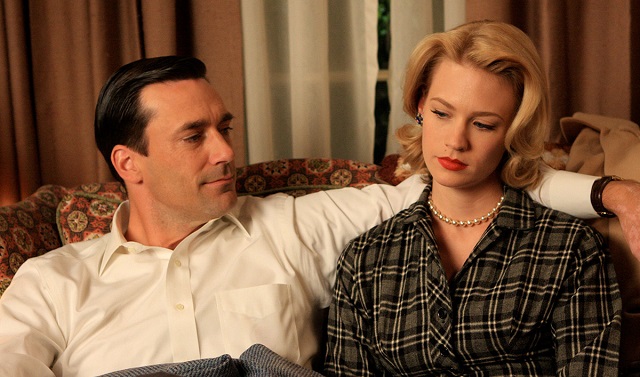
When you’re done reading below and your heart is feelin’ a little tender, this’ll give it a hug: Please Congratulate me on my Divorce.
As the young man settles into his seat next to mine, I am hit by the unmistakable whiff of alcohol.
After a few more drinks, my neighbor, contrary to my expectations of him snoring by now, attempts to interact.
I mentally roll my eyes and answer reluctantly at first—but the subject of our conversation draws me in.
Before I know it, my neighbor is pouring his soul out to me, a perfect stranger, as he would to anyone who’d listen. He is in so much emotional pain that no amount of alcohol seems able to numb it.
The story I hear is one of heartbreak and disappointment, and an irrevocable sense of failure.
He speaks of his love for his two-and-a-half-year-old daughter and tells me that he has just separated from his wife—and therefore his daughter too.
The degree of his suffering from the breakup and from having his daughter ripped out of his life makes an impression on me. He misses his daughter terribly, unable to see her every day for bath, dinner, story, and bed time. He is shocked that he had to leave his house—his house, he repeats for emphasis.
I realize that we rarely get to hear a man’s side in a story of divorce.
Whether that is due to unequal focus in the media or my own selective antennae, stories about the experiences of women in divorce seem to be more frequent, and tend to feature women as the victims, even when the decision has come from them.
As my neighbor shows me the pictures of his family smiling through what seems like a perfect vacation, I cannot help but ask: why? They look so happy! I learn the truth behind the smiley pictures: the relationship with his wife was stormy and had not been going well for a while; she was often complaining, there was screaming all the time. The perfect-looking family trip to Florida just a few weeks before was a total disaster that became the final straw, leading to the breakup upon their return.
What seems to be causing the most grief for my neighbor is his failure to protect his little daughter, to keep her world intact. He is guilt-ridden and cannot imagine ever finding happiness again. He proceeds to self-flagellate, convinced that his daughter is now wounded forever—her life irreparably flawed.
When, to answer his questions, I tell him that I have three daughters and have been married to their father for over 25 years, he literally cries out, “You see?! That was my dream! Your daughters are so lucky!”
My daughters are, indeed, lucky in many ways, but the fact that we all still live together has nothing to do with luck.
How could I explain in a few words on a plane ride the commitment, compromise, sacrifice, infinite patience, saint-like capacity to forgive, and simple daily acts of showing up for our duties over many years, my husband and I have had to practice to keep our children’s world intact?
As to my marriage being anybody’s dream…well, let’s just say it’s been a while since I’ve considered my own marriage dream material. A decades-long marriage has little to do with dreams. It has much more to do with hard labor.
A lot has been said about women’s often misguided romantic expectations from love and marriage, but it seems that men are just as plagued by these fairy tale delusions. They too fall victim to romantic ideology.
Today’s high divorce rates reflect how impossible it is for the reality of marriage to measure up to the pre-packaged blissful pictures we are sold in movies and consumer ads. Yet, relentlessly, most adults not yet coupled are consumed by their search for The One.
Navigating the modern dating scene has turned into such an ordeal that just graduating to the stage of commitment already feels like the ultimate prize. The Wedding has become the endgame—the goal in itself—as we still perceive it to be the entryway to the mythical Happily-Ever-After.
However, the most difficult work begins after that, “on the job,” as many of us learn the hard way.
The actual daily grind of marriage—aligning our differing upbringings, opinions, and needs—is often a rude awakening. With time, it becomes hard to remember that we are a team, actually on the same side, navigating life together.
What is puzzling is that while my neighbor on the plane dreamed of a long marriage and living under the same roof as his children, he admits that he took it all for granted. According to him, he never cheated, but he would often go out with his friends, could never refuse an invitation, worked long hours, and was often absent from home.
Apparently, the fantasy of a marriage had been instilled in him, but not the understanding of the underlying work and commitment it requires.
Just like my own husband, most men take the role of provider seriously. They work hard for their families. My neighbor on the plane worked hard too. He was often absent from home. But after work, the inability to refuse an invitation for some fun with his friends seemed stronger than any pull a bath time and story time with his daughter seems to represent now.
It’s as if the fact that we are supposed to marry “forever” blinds us to the truth that nothing is permanent. That marriage and parenthood require sustained presence and nurturing.
From personal experience and observing most couples around me, it would seem that men consistently put their work above all. Their role of the provider for the family is certainly an important one, and a huge source of pressure and stress. However, they often overlook the fact that this is only one of their roles. That besides their contribution as providers, they have also committed to the roles of husband and father, which are no less important (if not more important) and should require as much time investment, effort, and presence.
Everyone has to make space in their lives for this new entity called “family,” especially as children come into the picture. More often than not, it is still the woman who picks up the disproportional share of the work around housekeeping and childcare.
Women, increasingly, work as much as men, yet, as mothers, we simply cannot permit ourselves to shut out all of our responsibilities at home which make a family function.
As a result, a woman often drowns in chores and the first thing to go is self-care. As she becomes depleted and tired, there is no more room for romance. No grand dose of happy maternity hormones can prevent the frustration from building up. Over time, it becomes a bleeding wound, pressed every time we feel exhausted from doing an unequal share of the work for our family. Invariably, we turn into “the nagging wife,” which further alienates our husbands.
Two people who fell in love once-upon-a-time now behave as if they are in warring camps.
As equal breadwinners, women are less and less willing to carry all the other responsibilities for home and children on their own shoulders. Today, if men do not pick up their portion of the chores and are not present for their partners, it invariably leads to conflict and resentment, which is unsustainable long-term.
My own marriage has successfully turned me into a reluctant feminist, as I try to learn to communicate non-violently about issues that have become painful wounds: equal participation in chores and childcare, and being present for our relationship. I struggle daily to free my own role from conditioned patterns both in my husband’s and my own vision of our respective “places” in a marriage.
As women redefine stale gender roles and become less tolerant of slacking-off partners, they typically initiate divorce, which has become a source of empowerment for women—an event often linked to the pursuit of individual satisfactions, opportunities, and growth.
Nevertheless, the majority of people still associate divorce with real and profound failure in life.
Men apparently view divorce as a loss of family. When a woman leaves, she loses a partner, but she still has her family. When a man is left alone after the marriage falls apart, he often feels that he has nothing. And of course, the true victims of divorce are innocent children, who usually experience a huge psychological fallout as a result of their parents’ breakup.
No one wins (unless the relationship is abusive) when a family breaks up.
The pain is equal on both sides—men just show it differently. They may not go drinking with their buddies and cry to them. But they do cry to strangers on a plane.
We marry for love, but then take marriage for granted, as if the state of being in love—this prized thing that everyone searches for during the dating stages—will then take care of everything else.
It’s naïve and irresponsible for us to expect that a marriage can succeed without a conscious effort from both sides. It takes two for any partnership to work, and one person cannot be expected to do the lion’s share without doing irreparable damage to that feeling of connection that brought two people together in the first place.
It is time for both men and women to take off the rose-colored glasses, sober up, shatter the outdated gender role molds prescribed by our patriarchal society, and roll up our collective sleeves, because a real happily-ever-after requires huge personal investment from all parties involved.
Just like any living thing, marriages, and the people in them, change and evolve. Our fairy tales simply don’t tell us the whole story. No couple can survive this most challenging of human constructs without teamwork, communication, mindfulness, and compassion. This is what we should be teaching little girls and boys at story time.
Relephant read:
The Best Marriage Advice from a Divorced Woman.
Author: Galina Singer
Image: Mad Men, 1999
Editor: Khara-Jade Warren
Copy Editor: Nicole Cameron
Social Editor: Waylon Lewis






Read 0 comments and reply